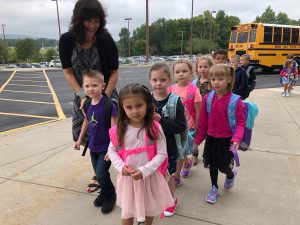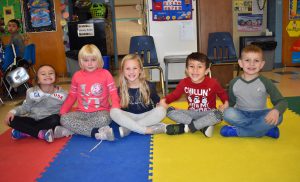
The dates for Minisink Valley’s kindergarten registration will be coming soon and you might be wondering: Is my child ready for the classroom?
Whatever age your child is when they start school, you can help begin their formal education as members of Minisink Valley’s Class of 2033 with confidence by being your child’s first and most important teacher.
To ensure the best possible school experience, there are skills and tasks all children should be comfortable with before entering the classroom. Otisville Elementary Principal Vincent Biele and Minisink Valley Elementary Principal Colleen Fitzgerald offer these reminders to help ensure your child is ready for their first day in their kindergarten classrooms!

1. Teach independence
The more things a child can do on their own, the more time they, and their teacher, will spend on classroom activities. Practice having your child:
· Use the toilet by themselves.
· Put on coats, boots and shoes with minimal assistance.
· Make choices: red or blue crayon; blocks or dolls.
2. Read together
Children have to learn to read before they can read to learn. Learning the alphabet is the first step.
· Sing the alphabet song together.
· Point to written letters as you sing.
· Point out the letters in your child’s name.
· Choose books about your child’s interests.
· Visit your local library and let your child choose books to read with you.
3. Count together
Recognizing numbers and understanding their relationship to one another is a basic foundational math skill.
· Count steps together while you walk or use stairs.
· Count pieces of cereal or crackers).
· Ask your child “how many?” when you see groups of items that number fewer than 10.
· Practice sorting and classifying—big, small, near, far, under, above, colors— as a way to reinforce early math skills.
4. Look for social opportunities
In preschool and kindergarten, children are learning social skills such as sharing, communicating and listening. Look for opportunities for your child to practice.
· Make playdates.
· Go to library story times.
· Visit local playgrounds.
5. Establish—or reinforce—routines
Help your child become accustomed to routines by establishing a set of activities to do every morning upon waking and every evening before bedtime.
· Get dressed.
· Brush teeth after meals.
· Put dirty clothes in a laundry hamper.
· Read before bed.
6. Engage your child in conversation
A 3-year-old might not yet have a robust vocabulary, but they can still express their needs, wants, hopes and fears in their own way. The more you talk with them, the more words they will learn.
· How do you feel?
· Why do you like this toy?
· Why are you scared?
Why is pre-K and kindergarten important?
Children benefit from early-education programs, like prekindergarten or kindergarten, because they learn academic and social skills that lay a solid foundation for the rest of their years in school. Kids who attend early-education programs receive higher reading, math and cognition test scores into early adulthood and earn more money over the course of their lifetime compared with those who did not have the benefit of early education.
Is my child not ready for school—or is it something else?
If you have questions about what your child should be able to do at their age, speak with your child’s pediatrician or contact Minisink Valley for support. The sooner kids get the help they need, the sooner they’ll be able to thrive at school.
So, your child will be going to school!
Whether it’s preschool or kindergarten that your child will be attending, change can be unsettling. Before school starts, here’s a few things parents should know and can do to help ease their family into a new school routine.
Visit the school
The more time your child spends at the school they’ll attend—especially with you—the more comfortable they’ll be when they start attending school by themselves.
· Arrange a tour at Otisville Elementary or Minisink Valley Elementary.
· Attend Minisink Valley concerts or other events that interest your child .
· Play on the playground.
Know the rules
Minisink Valley’s rules and policies ensure a safe and healthy environment for students and staff. The district posts student handbooks on this website. Take a look and become familiar with rules you know will impact your family, such as:
· Pick-up and drop-off times and locations.
· Parking.
· Food for classroom parties/birthdays.
· Safety policies, such as propping doors open.
· Visitor and volunteer rules and policies.
Attendance matters
Regular attendance builds the school-going habit and helps children develop relationships with teachers and school staff. Additionally:
· Teachers schedule their time in the classroom to the minute; late arrivals can disrupt learning and distract other students.
· Early grades lay the foundation for future learning, and regular attendance helps children develop the reading, writing and math skills they will need in the future.
· If your child says they don’t want to go to school, talk to your child’s teacher as soon as possible—you might be able to help address a small issue before it becomes a big problem.
Teamwork works
Once you’ve made the decision to enroll your child in school, think of their teacher and school as partners. You all have the same goal for your child: to be happy and successful.
Talk with your child about what’s happening in school and take advantage of the many ways Minisink Valley shares information with families.
· Parent-teacher conferences.
· Parent-teacher organizations.
· Paperwork sent home.
· The web pages for Otisville Elementary and Minisink Elementary.
· Your child’s teacher preferred method of communication.
If something is happening at home or school that you think is, or could, negatively affect your child, let the teacher know. He/she can work with you and your child to find solutions or accommodations to make school a positive place where your child can learn and grow.
